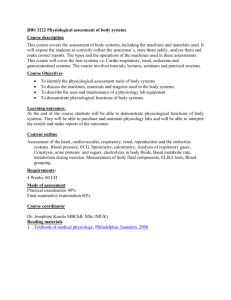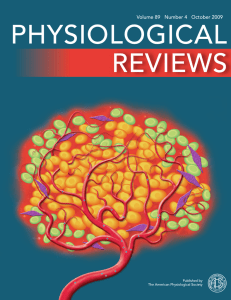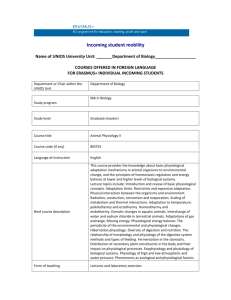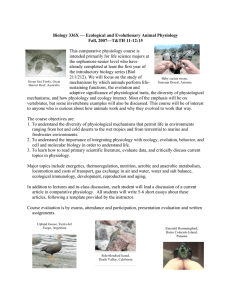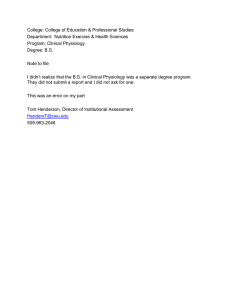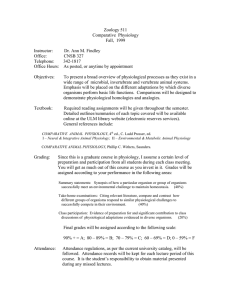EXCM 201 – PHYSIOLOGY OF EXERCISE (4 Credits) COURSE
advertisement
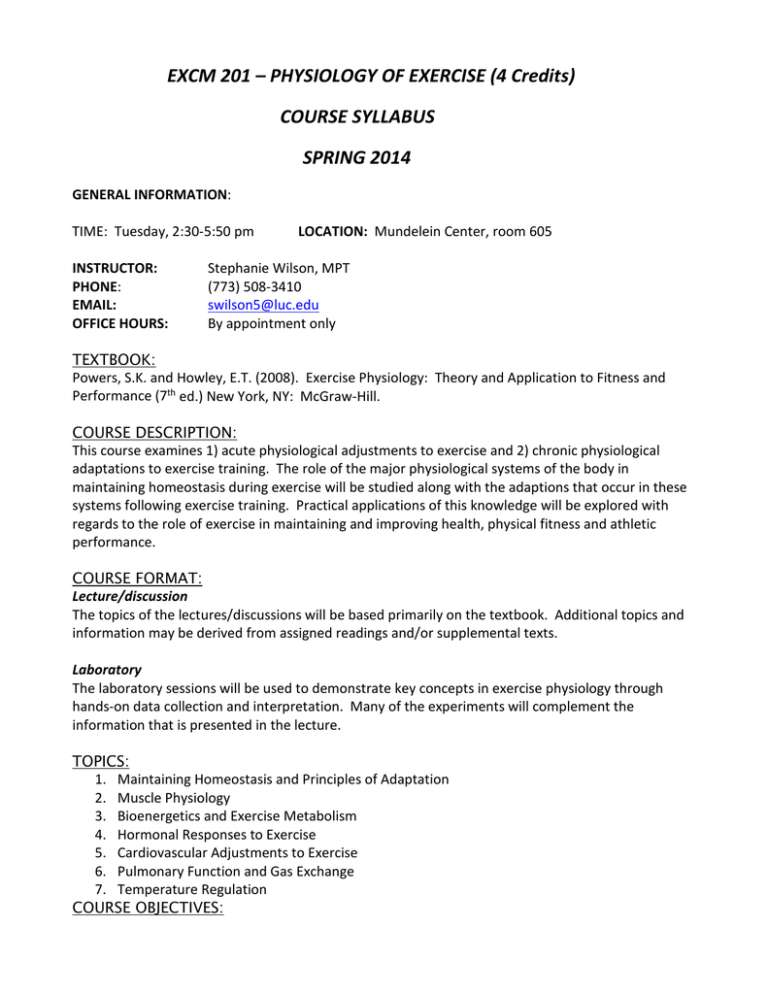
EXCM 201 – PHYSIOLOGY OF EXERCISE (4 Credits) COURSE SYLLABUS SPRING 2014 GENERAL INFORMATION: TIME: Tuesday, 2:30-5:50 pm INSTRUCTOR: PHONE: EMAIL: OFFICE HOURS: LOCATION: Mundelein Center, room 605 Stephanie Wilson, MPT (773) 508-3410 swilson5@luc.edu By appointment only TEXTBOOK: Powers, S.K. and Howley, E.T. (2008). Exercise Physiology: Theory and Application to Fitness and Performance (7th ed.) New York, NY: McGraw-Hill. COURSE DESCRIPTION: This course examines 1) acute physiological adjustments to exercise and 2) chronic physiological adaptations to exercise training. The role of the major physiological systems of the body in maintaining homeostasis during exercise will be studied along with the adaptions that occur in these systems following exercise training. Practical applications of this knowledge will be explored with regards to the role of exercise in maintaining and improving health, physical fitness and athletic performance. COURSE FORMAT: Lecture/discussion The topics of the lectures/discussions will be based primarily on the textbook. Additional topics and information may be derived from assigned readings and/or supplemental texts. Laboratory The laboratory sessions will be used to demonstrate key concepts in exercise physiology through hands-on data collection and interpretation. Many of the experiments will complement the information that is presented in the lecture. TOPICS: 1. Maintaining Homeostasis and Principles of Adaptation 2. Muscle Physiology 3. Bioenergetics and Exercise Metabolism 4. Hormonal Responses to Exercise 5. Cardiovascular Adjustments to Exercise 6. Pulmonary Function and Gas Exchange 7. Temperature Regulation COURSE OBJECTIVES: 1. Describe the structure and function of physiological systems in the body that are essential for the maintenance of homeostasis during exercise. 2. Identify and explain the important physiological responses that occur during exercise. 3. Identify and explain the important physiological adaptations that occur with exercise training. 4. Apply practical knowledge of exercise physiology to various health, fitness and athletic scenarios. COURSE EXPECTATIONS: 1. Attendance 2. Completion of laboratory readings/assignments on time 3. Participation in discussions and laboratory activities 4. Respect for instructor and classmates 5. Personal responsibility (Keep up to date with information on blackboard and Loyola e-mail) COURSE POLICIES: 1. Missed Quizzes and Exams • If a student is going to be absent on the day of a quiz or exam, the student may arrange to take it at an earlier time. 2. Assignments/Labs • Assignments will be announced at the beginning of class. 3. Cancellation of Class • Whenever possible, prior notification of class cancellations will be given via e-mail and Blackboard. 4. Academic Integrity • Academic dishonesty of any kind will not be tolerated and will result in failure of this course. • See the Loyola Undergraduate Catalog for specific guidelines. EVALUATION: GRADING CATEGORY 1. 2. 3. 4. 5. 6. EXAMS QUIZZES LAB REPORTS PROJECT/PAPER PRESENTATION FINAL EXAM GRADE SCALE: # 3 2 5 1 2 1 POINTS x x x x x X TOTAL POINTS 100 25 25 75 25 150 = = = = = = 300 50 125 75 50 150 TOTAL = 750 100-93 92-90 89-87 86-83 82-80 79-77 76-73 72-70 69-67 66-60 <60 A AB+ B BC+ C CD+ D F CLASSROOM ETIQUETTE Please be respectful in class and turn off all cell phones, ipods, and other electronic devices. Absolutely no phone calls, text messaging, emailing and listening to music will be allowed during class. COURSE EVALUATION EXPECTATION: It is a professional expectation that all students participate in course evaluations to guide ongoing program improvement. ACADEMIC INTEGRITY: The Loyola University Standard of academic integrity sets forth the responsibility of students to maintain integrity in academic work. The standard defines the expectations for maintaining academic integrity and describes the procedure for handling alleged violations of the standard. The standard addresses issues of academic dishonestly, including plagiarism and cheating. A full explanation of these definitions, and a description of procedures used in cases where student violations are alleged, is found in the Loyola University Standard of Academic Integrity. This Code may be modified from time-to-time. Students are responsible for being familiar with the edition currently in effect. http://www.luc.edu/academics/catalog/undergrad/reg academicintegrity.shtml ****This syllabus is intended to be a guide. The instructor reserves the right to make changes to any or all of its content at her discretion. Check Sakai often for updated information. COURSE SCHEDULE January 14 Syllabus/Lab Reports January 21 Chapter 2 – HOMEOSTATIS AND PRINCIPLES OF ADAPTATION January 28 Chapter 2 – HOMEOSTATIS AND PRINCIPLES OF ADAPTATION February 4 Quiz #1 Chapter 7 – THE NERVOUS SYSTEM February 11 Chapter 8 – THE SKELETAL SYSTEM February 18 EXAM #1 LAB #1 GROUP PROJECT ASSIGNMENT - BIOENERGETICS February 25 Chapter 3 – BIOENERGETICS Chapter 7 – CIRCULATORY RESPONSES TO EXERCISE March 4 No class, Spring Break March 11 Quiz #2 Chapter 7 – CIRCULATORY RESPONSES TO EXERCISE LAB #2 March 18 Chapter 10 – RESPIRATION AND GAS EXCHANGE March 25 EXAM #2 LAB #3 April 1st RESEARCH – PAPER ASSIGNMENT & GROUP PROJECT ASSIGNMENT April 8 Chapter 15 – WORK TESTS TO EVALUATE CARDIO RESPIRATORY FITNESS Chapter 5 – HORMONAL RESPONSES TO EXERCISE April 15 EXAM #3 LAB #4 April 22 LAB #5 GROUP PRESENTATIONS April 29 FINAL PAPER DUE
